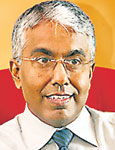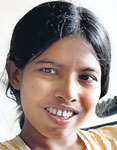She is in a wheelchair but the moment babies are mentioned her face breaks up into a smile.
Looking at 25-year-old L.M. Thushara Padmini Lindara from Kuliyapitiya it is difficult to imagine that she has carried and delivered through Caesarean section not just one but three babies.
For, this new mother of two boys and a girl is tiny in stature and only 138 centimetres tall. Her babies, unnamed as yet, were born on July 22 around 8 in the morning at one-minute intervals, with the girl being born last, while Padmini was conscious, having been given only spinal anaesthesia.
Padmini and her babies are a pointer to the good management of a difficult pregnancy. “Early diagnosis and constant monitoring helped us to deliver the babies without a problem,” says Consultant Gynaecologist and Obstetrician, Dr. Lakshman Kariyawasam of the De Soysa Hospital for Women who managed her from the time she was eight weeks into the pregnancy.
After confirming with a urine test that she was pregnant, it had been Padmini’s mother who had literally “dragged” her to Dr. Kariyawasam taking into consideration her diminutive body.
Reticent Dr. Kariyawasam gives credit to the facilities available in the form of ultra-sound scans for the successful conclusion of this triplet pregnancy. From the very first scan, done at eight weeks, he had detected the three foetuses and advised the family that Padmini needed bed-rest from then on to help foetal growth and prevent other complications.
So it was firstly bed-rest at home in Kuliyapitiya for four months, with both her mother and mother-in-law looking after her while husband Amila Prasad Priyadarshana, who sews samples at a garment factory, went to work.
Then, on Dr. Kariyawasam’s advice it was bed-rest in Ward 8, the gynaecological unit, of the De Soysa Hospital.
Many, many scans later, Dr. Kariyawasam had been planning a C-section for last Friday, at 35 weeks (the full-term for a foetus is 40 weeks) as the foetuses did not have enough space to grow, when Padmini’s water-bag ruptured and he along with Ward 8 Registrar Dr. Sudharshana de Silva and Intern Medical Officer Dr. Nalika Karunaratne delivered the babies on Tuesday. Dr. Kremlin Wickramasinghe had managed her in Ward 8.
 |
| Dr. Lakshman Kariyawasam |
Dr. Kariyawasam had been spot-on in his estimates after the scan, telling Padmini that she was carrying two boys and a girl and their weights were 1.45 kg, 1.25 kg and 1.1 kg respectively.
When they were delivered the boys’ weights had been absolutely right and the girl’s 1.0 kg, just .1 short.
Explaining the intricacies of pregnancies, Dr. Kariyawasam says that the body size is important in the delivery of a baby. A certain build is required for a normal vaginal delivery and in triplets it would be more complicated.
“This was a natural pregnancy and not one induced by drugs and medication,” he stresses, adding that in multi-pregnancies, foetal growth may be restricted while the mother could also go into early or premature labour. Fortunately, Padmini had no hypertension or diabetes.
That is why an early visit to an obstetrician is essential for the detection of such pregnancies and good management thereafter. “She and her family listened to our advice and as she was living in Kuliyapitiya it was vital that she was in or close to a hospital which had the necessary facilities for the management of such a pregnancy,” says Dr. Kariyawasam.
 |
| Thushara Padmini |
Not grumbling about the “confinement” firstly in Ward 8, then in the ante-natal Ward 5,when The Sunday Times visited her on Wednesday, it was the first day that Padmini had got on her feet in many months. Now in Ward 2, the post-natal ward, she makes regular trips to her little ones in the baby room and feeds them.
Dealing with the risks, Dr. Kariyawasam explains that if the mother in such a pregnancy does not get adequate rest, in the worst-case scenario there may be miscarriages or intra-uterine deaths. There could be premature rupture of the water bag and that’s why they need to be able to come to a tertiary-care centre with facilities such as ventilators and incubators for neo-natal care.
Although Padmini can be discharged from hospital in about four days, the babies are being kept under observation by the paediatrician.
By Kumudini H. Pix by M.A. Pushpa Kumara
Happy but worried
Padmini and Amila are happy, but their happiness is tinged with slight sadness.
For though they may have willing hands to help carry, bathe and lull to sleep the three bundles wrapped in pink and blue blankets, Amila is weighed down by worry as to how he will manage his finances, what with nappies and all the stuff that babies need.
Generous donors who wish to help this young family could please contact the De Soysa Hospital for Women on: Phone – 011-2696224 or e mail: kariw@sltnet.lk | 